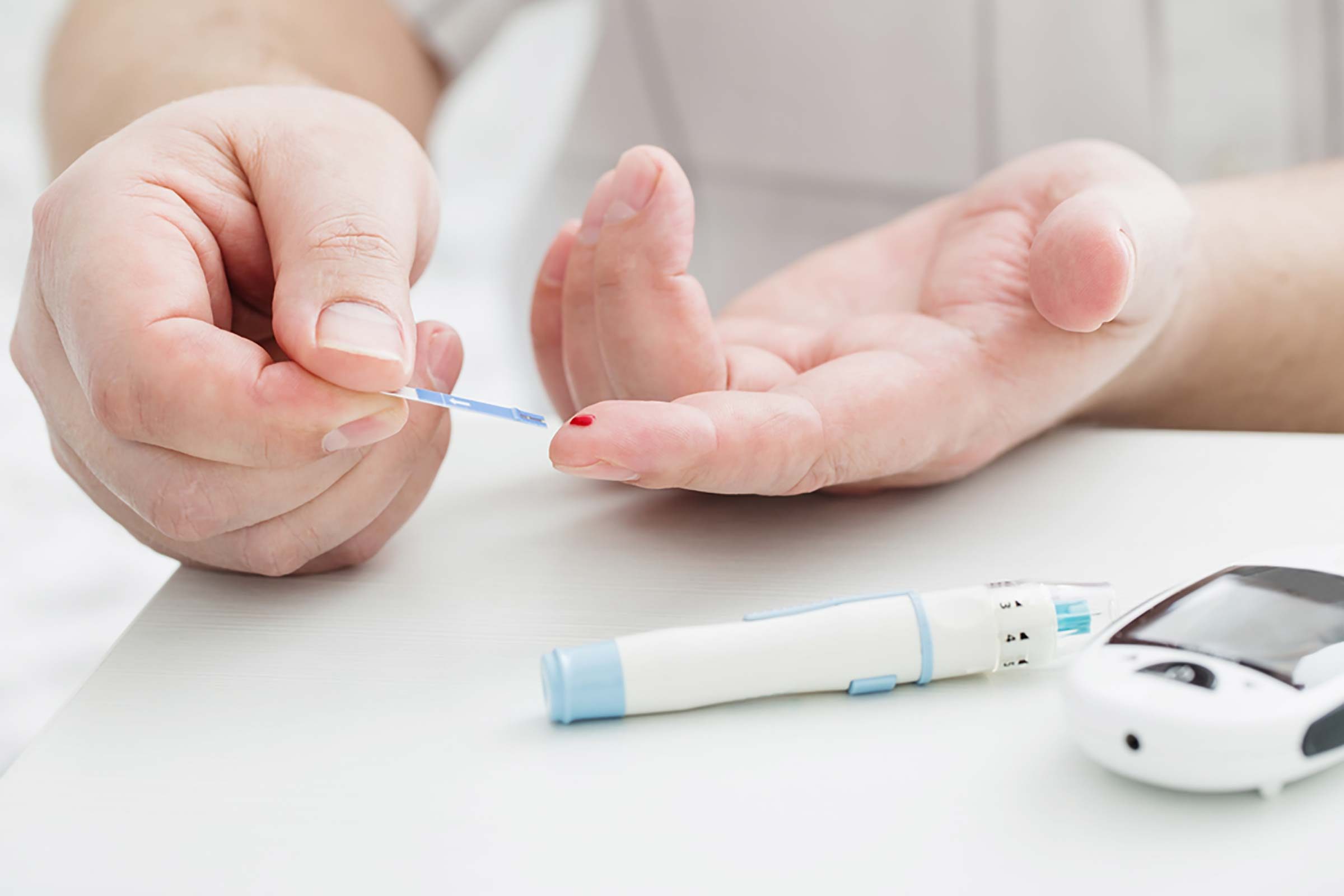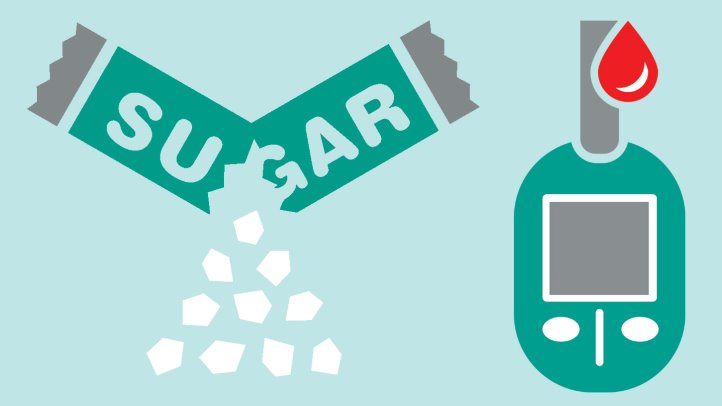Diabetes Care, Neuro & Mental Health
What Is Diabetes And What Causes It?
Are you rapidly losing weight? Do feel the urge to visit the bathroom frequently? Do you constantly feel thirsty and hungry? If your answer was yes to all the above questions, you must book an appointment with your doctor immediately and get your blood sugar levels checked.
If you already have, you probably know by now that you are diabetic.
Diabetes is a chronic disorder that happens when the pancreas is no longer able to produce insulin, or when the body cannot make best use of the insulin it produces.
Insulin is a hormone made by the pancreas, that acts like a crucial to let glucose from the food we consume pass from the bloodstream into the cells in the body to make energy. All carbohydrate foods are shattered down into glucose in the blood. Insulin aids glucose get into the cells.
 The main diabetes symptoms are:
The main diabetes symptoms are:

 Pre-diabetes illustrates a state in which blood glucose levels are higher than average, although not high adequate to be diagnosed with type 2 diabetes.
Pre-diabetes has no signs or no symptoms. People who are with pre-diabetes have a higher risk of developing type 2 diabetes and also cardiovascular (heart and circulation) disease.
Two million Indians have pre-diabetes and are at high risk of developing type 2 diabetes.
Without extended lifestyle changes, including healthy eating, increased activity and losing weight, approximately one in three people who are with pre-diabetes will go on to develop type 2 diabetes.
Pre-diabetes illustrates a state in which blood glucose levels are higher than average, although not high adequate to be diagnosed with type 2 diabetes.
Pre-diabetes has no signs or no symptoms. People who are with pre-diabetes have a higher risk of developing type 2 diabetes and also cardiovascular (heart and circulation) disease.
Two million Indians have pre-diabetes and are at high risk of developing type 2 diabetes.
Without extended lifestyle changes, including healthy eating, increased activity and losing weight, approximately one in three people who are with pre-diabetes will go on to develop type 2 diabetes.
 It is common for number of people with diabetes to begin to increase difficulties after having diabetes for a number of years.
With good diabetes control and subsistence a healthy, active lifestyle, it is feasible for people to go a number of decades complication free.
However, if you have had less well managed diabetes, have led a less healthy lifestyle, or had un diagnosed diabetes for a variety of years, the complications of diabetes are more likely to develop beginning.
The complications linked with diabetes have a common origin: too much glucose (sugar) in the blood. If blood glucose (sugar) levels endure high too often over time, it has a damaging effect on many of the body’s organs, essentially:
It is common for number of people with diabetes to begin to increase difficulties after having diabetes for a number of years.
With good diabetes control and subsistence a healthy, active lifestyle, it is feasible for people to go a number of decades complication free.
However, if you have had less well managed diabetes, have led a less healthy lifestyle, or had un diagnosed diabetes for a variety of years, the complications of diabetes are more likely to develop beginning.
The complications linked with diabetes have a common origin: too much glucose (sugar) in the blood. If blood glucose (sugar) levels endure high too often over time, it has a damaging effect on many of the body’s organs, essentially:
 Symptoms of type 1 diabetes frequently appear abruptly and are usually the reason for inspecting blood sugar levels.
Because symptoms of other types of diabetes and pre diabetes come on more moderately or may not be apparent, the American Diabetes Association (ADA) has suggested screening guidelines. The ADA suggests that the following people be screened for diabetes:
If the A1C test results aren’t consistent, the test isn’t obtainable, or you have specific states that can make the A1C test indefinite such as if you’re pregnant or have an abnormal form of hemoglobin (called as a hemoglobin variant) your doctor may use the below tests to diagnose diabetes:
Random blood sugar test. A blood sample will be taken at a random time. Nevertheless of when you last ate, a random blood sugar level of 200 milligrams per deciliter (mg/dL) 11.1 millimoles per liter (mmol/L) or higher recommends diabetes.
Fasting blood sugar test. A blood sample will be taken after an overnight fast. A fasting blood sugar level less than 100 mg/dL (5.6 mmol/L) is usual. A fasting blood sugar level from 100 to 125 mg/dL (5.6 to 6.9 mmol/L) is examined prediabetes. If it’s 126 mg/dL (7 mmol/L) or higher on two unconnected tests, you have diabetes.
Oral glucose tolerance test. For this particular test, you fast overnight, and the fasting blood sugar level is measured. Then you consume a sugary liquid, and blood sugar levels are tested occasionally for the next 2 hours.
A blood sugar level less than 140 mg/dL (7.8 mmol/L) is normal. A reading of more than 200 mg/dL (11.1 mmol/L) after 2 hours designates diabetes.
A reading between 140 and 199 mg/dL (7.8 mmol/L and 11.0 mmol/L) indicates prediabetes.
If type 1 diabetes is distrust, your urine will be tested to look for the appearance of a byproduct produced when muscle and fat tissue are utilized for energy because the body doesn’t have adequate insulin to use the available glucose (ketones).
Your doctor consultant will also likely run a test to see if you have the destructive immune system cells related with type 1 diabetes called autoantibodies.
Tests For Gestational Diabetes
Your healthcare professional will likely evaluate your risk factors for gestational diabetes early in your pregnancy:
If you’re at elevated risk of gestational diabetes — for sample, if you were obese at the begin of your pregnancy; you had gestational diabetes during a past pregnancy; or you have a mother, father, sibling or child who are with diabetes — your health specialist may test for diabetes at your first prenatal visit.
If you’re at average possibility of gestational diabetes, you’ll likely have a screening test for gestational diabetes sometime throughout your second trimester typically between 24 and 28 weeks of pregnancy.
If any of these test consequences occurs, testing should be returned on a various day to confirm the diagnosis. If a casual plasma glucose equal to 200 mg/dl or above is detected, the confirming test used should be a fasting plasma glucose or an oral glucose tolerance test.
Above you can know everything about diabetes. Diabetes can often be managed with healthy eating and regular physical activity.
However, some women may require medication (metformin) and/or insulin injections to help manage gestational diabetes. If you have recently been diagnosed with diabetes or have a family member with diabetes, view information on managing diabetes.
https://my.clevelandclinic.org/health/articles/11877-diabetes-complications
https://www.endocrineweb.com/conditions/type-2-diabetes/type-2-diabetes-complications
Symptoms of type 1 diabetes frequently appear abruptly and are usually the reason for inspecting blood sugar levels.
Because symptoms of other types of diabetes and pre diabetes come on more moderately or may not be apparent, the American Diabetes Association (ADA) has suggested screening guidelines. The ADA suggests that the following people be screened for diabetes:
If the A1C test results aren’t consistent, the test isn’t obtainable, or you have specific states that can make the A1C test indefinite such as if you’re pregnant or have an abnormal form of hemoglobin (called as a hemoglobin variant) your doctor may use the below tests to diagnose diabetes:
Random blood sugar test. A blood sample will be taken at a random time. Nevertheless of when you last ate, a random blood sugar level of 200 milligrams per deciliter (mg/dL) 11.1 millimoles per liter (mmol/L) or higher recommends diabetes.
Fasting blood sugar test. A blood sample will be taken after an overnight fast. A fasting blood sugar level less than 100 mg/dL (5.6 mmol/L) is usual. A fasting blood sugar level from 100 to 125 mg/dL (5.6 to 6.9 mmol/L) is examined prediabetes. If it’s 126 mg/dL (7 mmol/L) or higher on two unconnected tests, you have diabetes.
Oral glucose tolerance test. For this particular test, you fast overnight, and the fasting blood sugar level is measured. Then you consume a sugary liquid, and blood sugar levels are tested occasionally for the next 2 hours.
A blood sugar level less than 140 mg/dL (7.8 mmol/L) is normal. A reading of more than 200 mg/dL (11.1 mmol/L) after 2 hours designates diabetes.
A reading between 140 and 199 mg/dL (7.8 mmol/L and 11.0 mmol/L) indicates prediabetes.
If type 1 diabetes is distrust, your urine will be tested to look for the appearance of a byproduct produced when muscle and fat tissue are utilized for energy because the body doesn’t have adequate insulin to use the available glucose (ketones).
Your doctor consultant will also likely run a test to see if you have the destructive immune system cells related with type 1 diabetes called autoantibodies.
Tests For Gestational Diabetes
Your healthcare professional will likely evaluate your risk factors for gestational diabetes early in your pregnancy:
If you’re at elevated risk of gestational diabetes — for sample, if you were obese at the begin of your pregnancy; you had gestational diabetes during a past pregnancy; or you have a mother, father, sibling or child who are with diabetes — your health specialist may test for diabetes at your first prenatal visit.
If you’re at average possibility of gestational diabetes, you’ll likely have a screening test for gestational diabetes sometime throughout your second trimester typically between 24 and 28 weeks of pregnancy.
If any of these test consequences occurs, testing should be returned on a various day to confirm the diagnosis. If a casual plasma glucose equal to 200 mg/dl or above is detected, the confirming test used should be a fasting plasma glucose or an oral glucose tolerance test.
Above you can know everything about diabetes. Diabetes can often be managed with healthy eating and regular physical activity.
However, some women may require medication (metformin) and/or insulin injections to help manage gestational diabetes. If you have recently been diagnosed with diabetes or have a family member with diabetes, view information on managing diabetes.
https://my.clevelandclinic.org/health/articles/11877-diabetes-complications
https://www.endocrineweb.com/conditions/type-2-diabetes/type-2-diabetes-complications
What Are The Symptoms Of Diabetes?
 The main diabetes symptoms are:
The main diabetes symptoms are:
- Feeling very thirsty
- Cuts or wounds that heal slowly
- Blurred vision
- Urinating more often than usual, certainly at night
- Feeling very tired
- Itching around your penis or vagina, or frequent episodes of thrush
- Weight loss and loss of muscle bulk.
What Are The Causes Of Diabetes?

Causes Of Diabetes Type 1
Type 1 diabetes is generally caused by the immune system obliterating the cells in the pancreas that produce insulin. This causes diabetes by vacating the body without adequate insulin to function usually. This is called as an autoimmune reaction, or autoimmune cause, because the body is attacking itself. There is no particular diabetes causes, but the below triggers may be involved:- Viral or bacterial infection
- Unidentified component causing autoimmune reaction
- Chemical toxins within food
- Underlying genetic arrangement may also be a type 1 diabetes cause.
Type 2 Diabetes Causes
What causes diabetes type 2? Type 2 diabetes causes are generally multifactorial – more than one diabetes cause is included. Frequently, the most huge factor is a family history of type 2 diabetes. This is the most likely type 2 diabetes cause. There are some risk factors for type 2 diabetes, any or all of which enhance the chances of evolving the condition. These include:- Obesity
- Living a sedentary lifestyle
- Improving age
- Bad diet
- Another type 2 diabetes causes like pregnancy or illness can be type 2 diabetes risk factors.
Gestational Diabetes Causes
The causes of diabetes in pregnancy also called gestational diabetes rest unknown. However, there are a variety of risk factors that enhance the chances of evolving this condition:- The family history of gestational diabetes
- Overweight or Obese
- Suffer from polycystic ovary syndrome
- Have had a big baby weighing over 9lb
- Causes of gestational diabetes may also be linked to ethnicity – some ethnic groups have a greater danger of gestational diabetes.
Other Diabetes Causes
There are some other potential diabetes causes. These include the below:- Pancreatitis is also called as pancreatectomy it is a cause of diabetes. Pancreatitis is called to enhance the risk of developing diabetes, as is a pancreatectomy.
- Polycystic Ovary Syndrome (PCOS). One of the root causes of Polycystic Ovary Syndrome is obesity-linked insulin resistance, which will also enhance the risk of pre-diabetes and type 2 diabetes.
- Cushing’s syndrome. This syndrome improves production of the cortisol hormone, which serves to enhanced blood glucose levels. An over-abundance of cortisol can cause diabetes.
- Glucagonoma. Patients with glucagonoma may undergo diabetes because of an absence of equilibrium between levels of insulin production and glucagon production.
- Steroid-induced diabetes (steroid diabetes) is an uncommon form of diabetes that happens due to prolonged use of glucocorticoid therapy.
What Is Pre-Diabetes?
 Pre-diabetes illustrates a state in which blood glucose levels are higher than average, although not high adequate to be diagnosed with type 2 diabetes.
Pre-diabetes has no signs or no symptoms. People who are with pre-diabetes have a higher risk of developing type 2 diabetes and also cardiovascular (heart and circulation) disease.
Two million Indians have pre-diabetes and are at high risk of developing type 2 diabetes.
Without extended lifestyle changes, including healthy eating, increased activity and losing weight, approximately one in three people who are with pre-diabetes will go on to develop type 2 diabetes.
Pre-diabetes illustrates a state in which blood glucose levels are higher than average, although not high adequate to be diagnosed with type 2 diabetes.
Pre-diabetes has no signs or no symptoms. People who are with pre-diabetes have a higher risk of developing type 2 diabetes and also cardiovascular (heart and circulation) disease.
Two million Indians have pre-diabetes and are at high risk of developing type 2 diabetes.
Without extended lifestyle changes, including healthy eating, increased activity and losing weight, approximately one in three people who are with pre-diabetes will go on to develop type 2 diabetes.
There Are Two Pre-Diabetes Conditions:
Impaired glucose tolerance (which is also known as IGT) is where blood glucose levels are larger than average but not high sufficient to be classified as diabetes. Impaired fasting glucose (which is also called as IFG) is where blood glucose levels are escalated in the fasting state but not high adequate to be classified as diabetes. It is viable to have both Impaired Fasting Glucose (IFG) and Impaired Glucose Tolerance (IGT).Diabetes Complications
Uncontrolled diabetes can lead to a variety number of short and long-term health difficulties, including hypoglycemia, heart disorder, nerve damage and amputation, and also vision problems. The majority of these diabetes-related state occur as a result of uncontrolled blood glucose levels, particularly raised blood sugar over a extended period of time. It is important that diabetics are aware of the difficulties that can happen as a result of diabetes to assure that the first symptoms of any potential illness are detected before they begin. In this section, you’ll discover information on all of the diseases, disorders and complications that are linked to diabetes, including the various causes, symptoms and treatments for specific condition.How Common Are Difficulties Of Diabetes?
 It is common for number of people with diabetes to begin to increase difficulties after having diabetes for a number of years.
With good diabetes control and subsistence a healthy, active lifestyle, it is feasible for people to go a number of decades complication free.
However, if you have had less well managed diabetes, have led a less healthy lifestyle, or had un diagnosed diabetes for a variety of years, the complications of diabetes are more likely to develop beginning.
The complications linked with diabetes have a common origin: too much glucose (sugar) in the blood. If blood glucose (sugar) levels endure high too often over time, it has a damaging effect on many of the body’s organs, essentially:
It is common for number of people with diabetes to begin to increase difficulties after having diabetes for a number of years.
With good diabetes control and subsistence a healthy, active lifestyle, it is feasible for people to go a number of decades complication free.
However, if you have had less well managed diabetes, have led a less healthy lifestyle, or had un diagnosed diabetes for a variety of years, the complications of diabetes are more likely to develop beginning.
The complications linked with diabetes have a common origin: too much glucose (sugar) in the blood. If blood glucose (sugar) levels endure high too often over time, it has a damaging effect on many of the body’s organs, essentially:
- The kidneys (nephropathy
- The eyes (retinopathy)
- The nervous system (neuropathy)
- The heart (heart attack)
- The blood vessels (high blood pressure, Arteriosclerosis, stroke, etc.)
- Sleep apnea
- Capsulitis
- Erectile dysfunction
- Yeast infections
- Urinary tract infections
- Periodontal disease.
- Age
- Heredity
- Duration of the diabetes
- Lifestyle.
Various Diagnosis For Diabetes
 Symptoms of type 1 diabetes frequently appear abruptly and are usually the reason for inspecting blood sugar levels.
Because symptoms of other types of diabetes and pre diabetes come on more moderately or may not be apparent, the American Diabetes Association (ADA) has suggested screening guidelines. The ADA suggests that the following people be screened for diabetes:
If the A1C test results aren’t consistent, the test isn’t obtainable, or you have specific states that can make the A1C test indefinite such as if you’re pregnant or have an abnormal form of hemoglobin (called as a hemoglobin variant) your doctor may use the below tests to diagnose diabetes:
Random blood sugar test. A blood sample will be taken at a random time. Nevertheless of when you last ate, a random blood sugar level of 200 milligrams per deciliter (mg/dL) 11.1 millimoles per liter (mmol/L) or higher recommends diabetes.
Fasting blood sugar test. A blood sample will be taken after an overnight fast. A fasting blood sugar level less than 100 mg/dL (5.6 mmol/L) is usual. A fasting blood sugar level from 100 to 125 mg/dL (5.6 to 6.9 mmol/L) is examined prediabetes. If it’s 126 mg/dL (7 mmol/L) or higher on two unconnected tests, you have diabetes.
Oral glucose tolerance test. For this particular test, you fast overnight, and the fasting blood sugar level is measured. Then you consume a sugary liquid, and blood sugar levels are tested occasionally for the next 2 hours.
A blood sugar level less than 140 mg/dL (7.8 mmol/L) is normal. A reading of more than 200 mg/dL (11.1 mmol/L) after 2 hours designates diabetes.
A reading between 140 and 199 mg/dL (7.8 mmol/L and 11.0 mmol/L) indicates prediabetes.
If type 1 diabetes is distrust, your urine will be tested to look for the appearance of a byproduct produced when muscle and fat tissue are utilized for energy because the body doesn’t have adequate insulin to use the available glucose (ketones).
Your doctor consultant will also likely run a test to see if you have the destructive immune system cells related with type 1 diabetes called autoantibodies.
Tests For Gestational Diabetes
Your healthcare professional will likely evaluate your risk factors for gestational diabetes early in your pregnancy:
If you’re at elevated risk of gestational diabetes — for sample, if you were obese at the begin of your pregnancy; you had gestational diabetes during a past pregnancy; or you have a mother, father, sibling or child who are with diabetes — your health specialist may test for diabetes at your first prenatal visit.
If you’re at average possibility of gestational diabetes, you’ll likely have a screening test for gestational diabetes sometime throughout your second trimester typically between 24 and 28 weeks of pregnancy.
If any of these test consequences occurs, testing should be returned on a various day to confirm the diagnosis. If a casual plasma glucose equal to 200 mg/dl or above is detected, the confirming test used should be a fasting plasma glucose or an oral glucose tolerance test.
Above you can know everything about diabetes. Diabetes can often be managed with healthy eating and regular physical activity.
However, some women may require medication (metformin) and/or insulin injections to help manage gestational diabetes. If you have recently been diagnosed with diabetes or have a family member with diabetes, view information on managing diabetes.
https://my.clevelandclinic.org/health/articles/11877-diabetes-complications
https://www.endocrineweb.com/conditions/type-2-diabetes/type-2-diabetes-complications
Symptoms of type 1 diabetes frequently appear abruptly and are usually the reason for inspecting blood sugar levels.
Because symptoms of other types of diabetes and pre diabetes come on more moderately or may not be apparent, the American Diabetes Association (ADA) has suggested screening guidelines. The ADA suggests that the following people be screened for diabetes:
If the A1C test results aren’t consistent, the test isn’t obtainable, or you have specific states that can make the A1C test indefinite such as if you’re pregnant or have an abnormal form of hemoglobin (called as a hemoglobin variant) your doctor may use the below tests to diagnose diabetes:
Random blood sugar test. A blood sample will be taken at a random time. Nevertheless of when you last ate, a random blood sugar level of 200 milligrams per deciliter (mg/dL) 11.1 millimoles per liter (mmol/L) or higher recommends diabetes.
Fasting blood sugar test. A blood sample will be taken after an overnight fast. A fasting blood sugar level less than 100 mg/dL (5.6 mmol/L) is usual. A fasting blood sugar level from 100 to 125 mg/dL (5.6 to 6.9 mmol/L) is examined prediabetes. If it’s 126 mg/dL (7 mmol/L) or higher on two unconnected tests, you have diabetes.
Oral glucose tolerance test. For this particular test, you fast overnight, and the fasting blood sugar level is measured. Then you consume a sugary liquid, and blood sugar levels are tested occasionally for the next 2 hours.
A blood sugar level less than 140 mg/dL (7.8 mmol/L) is normal. A reading of more than 200 mg/dL (11.1 mmol/L) after 2 hours designates diabetes.
A reading between 140 and 199 mg/dL (7.8 mmol/L and 11.0 mmol/L) indicates prediabetes.
If type 1 diabetes is distrust, your urine will be tested to look for the appearance of a byproduct produced when muscle and fat tissue are utilized for energy because the body doesn’t have adequate insulin to use the available glucose (ketones).
Your doctor consultant will also likely run a test to see if you have the destructive immune system cells related with type 1 diabetes called autoantibodies.
Tests For Gestational Diabetes
Your healthcare professional will likely evaluate your risk factors for gestational diabetes early in your pregnancy:
If you’re at elevated risk of gestational diabetes — for sample, if you were obese at the begin of your pregnancy; you had gestational diabetes during a past pregnancy; or you have a mother, father, sibling or child who are with diabetes — your health specialist may test for diabetes at your first prenatal visit.
If you’re at average possibility of gestational diabetes, you’ll likely have a screening test for gestational diabetes sometime throughout your second trimester typically between 24 and 28 weeks of pregnancy.
If any of these test consequences occurs, testing should be returned on a various day to confirm the diagnosis. If a casual plasma glucose equal to 200 mg/dl or above is detected, the confirming test used should be a fasting plasma glucose or an oral glucose tolerance test.
Above you can know everything about diabetes. Diabetes can often be managed with healthy eating and regular physical activity.
However, some women may require medication (metformin) and/or insulin injections to help manage gestational diabetes. If you have recently been diagnosed with diabetes or have a family member with diabetes, view information on managing diabetes.
https://my.clevelandclinic.org/health/articles/11877-diabetes-complications
https://www.endocrineweb.com/conditions/type-2-diabetes/type-2-diabetes-complications



Medicines for diabetes
Hi, Ashok m
you can take the below supplements
INLIFE Diastan Noni Juice
Dosage: Take 15 ml (1 serving) with 100 ml of water. Best time to juice will be empty stomach early morning 30 minutes before your first meal
LINK: https://www.inlifehealthcare.com/shop/diastan-noni-juice-diabetes/
INLIFE Gymnema Sylvestre
Dosage: 1 capsule in the morning and 1 capsule in the evening daily before meals
LINK: https://www.inlifehealthcare.com/shop/gymnema-sylvestre-vegetarian-capsules/